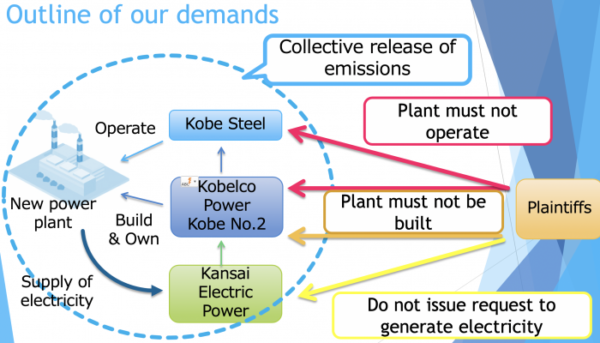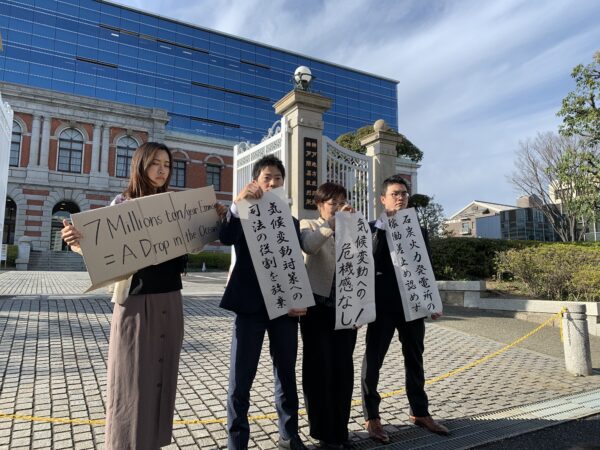Two court cases concerning Kobe Power Plant Units 3 and 4,built and operated by Kobe Steel, Ltd. concluded in March 2023. A protest group led by residents living in the surrounding area has been demanding the plant’s cancellation, and filed two court cases on the grounds of the plant’s impacts on air pollution and climate change.
One of the cases is an administrative lawsuit seeking a reversal of the decision by the Japanese government (Ministry of Economy, Trade and Industry) to allow the construction of new units at the Kobe coal-fired power station in the midst of an escalating climate crisis. The other case is a civil lawsuit against Kobe Steel and its subsidiary Kobelco Power Kobe No. 2, which are constructing and operating the coal-fired power plant, as well as Kansai Electric Power Co. Plaintiffs and their attorneys have been fighting for these two climate change lawsuits against the construction of coal-fired power stations since 2018.
Unfortunately, the results of the two cases were very disappointing; neither decision granted the plaintiffs’ injunction request against the operation of the new coal-fired power units.
Date of Judgment
March 9, administrative lawsuit: the Supreme Court rejected the plaintiffs’ appeal
March 20, civil lawsuit: the Kobe District Court ruled against the residents (plaintiffs)
The Supreme Court ruled to dismiss the plaintiff’s appeal
In the administrative lawsuit, the Supreme Court ruled on March 9, 2023 to dismiss the plaintiffs’ appeal, rejecting their petition for acceptance of appeal. The defeat of the plaintiffs marks the end of a trial that had been ongoing since 2018.
The plaintiffs and their attorneys released a joint statement (Link, written in Japanese) and pointed out four issues with the court’s decision.
1. The decision shows a lack of both a sense of urgency about climate change and a lack of understanding of climate science;
2. A lack of legal recognition that climate change is a real and serious violation of human rights, and a violation of the human rights of all individuals;
3. Maximum regard placed on discretion in administrative decisions and refraining from judicial involvement; and
4. While courts around the world, including in the EU, have skillfully applied traditional legal theory and jurisprudence to climate change issues in new judgments and served as bastions of human rights, Japan’s judiciary has made the choice to abandon this role.
However, the statement mentioned that the lack of a sense of urgency about climate change and lack of awareness of the current flaws in environmental impact assessments (EIA) is not only a problem of the court, but also an indication of these among the Japanese public as well, including in the media. It raised the issue of the need for a major change in current social perceptions. These issues were responsible for the decision issued by the Osaka High Court on April 26, 2022.
Lawsuit seeking an injunction against the new power units’ operation found no danger
The civil lawsuit concluded on March 20, 2023. This lawsuit was filed against Kobe Steel, its subsidiary Kobelco Power Kobe No. 2, and Kansai Electric Power Company (KEPCO), who purchase electricity from the power plant. The suit demanded that 1) they must not build new coal-fired power units (Unit 3 and 4); 2) they must not operate those units; and 3) they must not give instruction to begin generation.。

The main issues stated were the health effects of air pollutants emitted by coal-fired power plants, and the impact on climate change due to their significant greenhouse gas emissions.
In response to claims that air pollutant emissions, particularly PM2.5, violate the personal rights of residents, the court ruled that the concentration of PM2.5 from the power plant that residents would be exposed to is not at a level that poses a concrete danger to their health. Additionally, the plaintiffs’ claim that their right to live peacefully would be infringed upon by the risk of health violations due to PM2.5 was not accepted by the court, stating that there was no objective risk sufficient enough to cause such serious anxiety.
On the impact on climate change by CO2 emissions from coal-fired power plants, the court acknowledged in general terms that significant emissions, including emissions from coal-fired power stations, contribute to the worsening of climate change. It also acknowledged that an injunction can be requested on the grounds of infringement of personal rights (life, health, etc.) due to global warming and climate change caused by CO2 emissions.
However, the court did not approve the claim by the plaintiffs regarding the danger of CO2 emissions, stating that their fears about the damage caused by global warming are fears about uncertain future dangers, and therefore cannot be considered subject to legal protection at this point in time. Compared to the world’s leading climate-related cases such as those ruled in the Netherlands and Germany, it must be said that Japanese cases are far behind in both the science of climate change and in the recognition of international politics.
The plaintiffs and their attorneys have stated (Link, written in Japanese) that they will continue to shine light on the issues concerning coal-fired power stations, including the Kobe coal-fired power station, as global emitters of pollution – not only to the courts, power plant operators, and citizens, but also to the international community.
Regarding the civil lawsuit seeking an injunction against the operation of the Kobe coal-fired power station Units 3 and 4, the plaintiffs are planning to appeal, and the case will move from the Kobe District Court to the Osaka High Court.
Related Link
Kobe Climate Case web site (Link)

